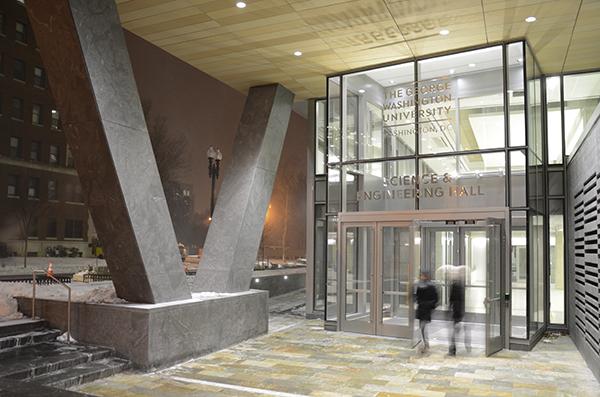More than 800 people have signed a petition in the last week that asks GW to keep the Science and Engineering Hall open past 10 p.m. so students can study late into the night.
School of Engineering and Applied Science students started the petition after University Police Department officers asked them to leave the building late at night, a time they said they use to finish homework and projects.
For years, student leaders have petitioned for late-night access to campus buildings like Duquès Hall.
One side of the ground level of the Science and Engineering Hall is lined with group study rooms, while other floors have chairs, couches and study tables that students use.
Shakti Gurikar, a sophomore majoring in biomedical engineering, said he signed the petition because students need the space to study.
“It’s GW’s new baby, their crown jewel. They want to preserve it and protect it. But it is impractical to not let us in,” Gurikar said.
University spokesman Kurtis Hiatt said students who need to study late at night but don’t need lab access can work in Gelman Library or the Marvin Center.
He said the building is open to “all GW community members” from 7 a.m. to 10 p.m. Monday through Friday, and 9 a.m. to 6 p.m. on Saturday and Sunday. He said that “outside of these hours, the SEH will be open to staff, faculty, researchers and students who need access to research space within the building.”
“The George Washington Police Department is working with schools and departments to determine who requires overnight access and to implement a process that allows them to continue their academic and research activities after the building closes,” Hiatt said.
Brandon Bernier, the graduate teaching assistant who started the petition, did not return requests for comment.
“We need to at least open a dialogue to get GW to understand that engineers need some place to work with other engineers, at the times that engineers tend to work,” the petition states.
In 2013, then-Student Association President Ashwin Narla presented a 22-page proposal and a petition to administrators that called for keeping rooms in academic buildings open for studying, with limited success. That year, GW started giving students access to Funger and Duquès halls until 2 a.m.
GW also renovated the Marvin Center in 2013, giving students additional study space. The building now stays open until 2 a.m.
But since those changes, lobbying for more student space has subsided as Student Association leaders have prioritized other issues, like student health and counseling, in the past year.
Lucas Pollok, a junior mechanical engineering major, said the Science and Engineering Hall is an educational resource, but it also provides science and engineering students with a place to meet.
“I feel like it encourages study groups and gives the engineering students a sense of community,” Pollok said.
Still, Pollok said he’s not optimistic that the petition will change how long students can stay in the building.
“I could imagine that it would cost the school extra money and that they aren’t ready to spend that extra money on an already very expensive building. But I hope to be proven wrong,” Pollok said.
Murray Loew, an engineering professor who works in the building, said he’s concerned about the expensive equipment inside.
“How do we maintain security for all the things that need it and the same time allow students to be in it?” Loew said. “This building isn’t like the library or the Marvin Center. It has a lot of things in it that we are concerned about access to.”








